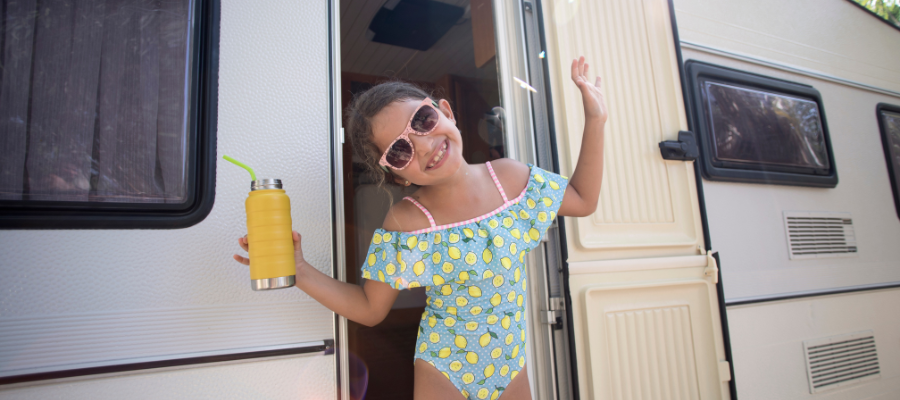Find the fun and own the chaos: A roadmap to planning holidays as a PDA parent

For many parents, school holidays signal beachside getaways, camping escapes, a break from 8am sprints to sporting events, and maybe even the odd sleep-in. Yet, there are many other parents quietly nursing a sense of nervousness as this change in routine approaches.
For families with children who are neurodivergent, and those who might have a child with PDA, managing the holiday period can be a little more complex.
As we grow to understand that families move to the rhythms of different drums, it becomes clear that conforming to society’s expectations is neither easy nor always possible for parents caring for a child with PDA.
Drawing from my experience as a child psychologist supporting children with PDA, I’d like to share a few tips to help parents of neurodivgent children navigate the school holidays.
By noticing the moments that sparkle—the daily glimmers, the small wins—and viewing the low points as opportunities to learn, families can hopefully find joy and a sense of achievement during the school holidays.
Slow down to speed up.
For many children with PDA, true joy lies in simple pleasures: sleeping in, choosing activities that match their interests like walks or little adventures, and most of all, enjoying the freedom to be without pressure.
After a year of demands and deadlines, relaxing can be a welcome relief. While it’s natural to want to keep kids busy, children with PDA often benefit more from a flexible routine that balances active and calm periods.
We are told predictability matters, but building flexibility is critical. Downtime paired with sensory activities like tactile play, calming music, or simple crafts can help create a relaxed and enjoyable holiday for everyone.
Holidays are also a time to relax from societal expectations. Let your child wear pyjamas all day or skip an event if it feels like too much. Focus on their well-being and yours.
Adjusting plans to meet your child’s needs helps reduce pressure for everyone and makes the holidays more manageable.
Test the low-demand approach.
When parents see me, they’ve often tried every traditional parenting strategy and are prepared to try something different—including the low-demand approach. For those unfamiliar, the low demand approach helps children feel less stressed by being aware of hidden demands and shifting language to reduce expectations and pressure. The aim is to reduce the triggers that can lead to meltdowns and emotional distress. It challenges the traditional ways we’ve been taught to parent.
Imagine this: a child with PDA runs into their end-of-year Christmas performance with no shoes and a t-shirt they’ve worn for days—not because their parents don’t care, but because they’ve chosen a low-demand approach. They’ve focused on helping their child feel safe and comfortable, rather than adding pressure that could lead to anxiety or upset.
To do this, parents need to overlook the fact that, yes, sometimes it’s your child that is the one who still has breakfast on his sleeve. In the scheme of things, does that really matter? Arguably, it matters less than missing out.
Christmas concerts can be a source of stress for many families, particularly those with a PDA child, where even arriving on time can feel like an uphill battle. Taking a low-demand approach can help create a calmer, more positive experience for everyone. One way to ease the pressure is by offering choices that empower your child. For example, laying out a few outfit options or costumes allows them to feel in control, reducing resistance and fostering a sense of autonomy.
Choices can have a powerful impact on creating a sense of calm and balance.
Before you’re due to leave, you might set up some activities that they find calming before, even leaning into their special interests, essentially setting a calm environment.
You might also offer the option to arrive or leave early to avoid the stressors of the hustle and bustle of the concert crowd. Lastly, keep it in your mind that not going is always an option too. Sometimes, letting go is the kindest choice.
While not easy, we can train ourselves to block out the assumptions made by people who don’t understand or love your child like you do. The result? Attending the concert with a sense of achievement that you’ve attended as a family, you’re calm, your child is happy (enough) and you’re creating memories.
Schedule ‘I Matter’ moments, often.
Taking time for yourself will look different for everyone, but one thing is clear: small daily rituals help build inner resilience. That’s the quiet voice in our heads that says keep going—even when we’re out of puff and half-considering running away to join the circus.
Caring for others is a marathon, and the reality is that many parents don’t always have the time, energy, or resources to prioritise themselves.
But according to Carers Australia, building moments of self-care into the day is essential—not optional. Even small breaks can make a big difference.
They recommend taking short breaks throughout the day—even just 10 minutes every few hours. Try creating a list of things you enjoy for those moments: a TV show, a podcast, texting a friend, or stepping outside. Aim to do at least one each day.
Even small actions, like drinking more water or getting five minutes of sunlight, can have an impact. Over time, these simple basics become the foundation for deeper self-care.

Don’t cancel that holiday.
When families visit my clinic, they’re often beginning to wonder if their child’s behaviour might point to something more, like ADHD or PDA. Social withdrawal is often part of the picture, and holidays end up in the ‘too hard basket.’
But family holidays are more than just a ‘very expensive change of sinks.’ They’re important. In today’s endlessly demanding world, they offer a much-needed break for parents to reconnect with their children and spend time together. When families stop planning holidays, it can have a deeper impact on wellbeing and family dynamics.
Preparing for a trip with a child who has a PDA profile can feel daunting, but with thoughtful planning, everyone can have a good time. Build in their current interests, allow for flexibility, and keep expectations low. Focus on helping your child feel secure and supported throughout the trip. Even going to the same familiar place can make a big difference.
Connecting with PDA-aware professionals can help you identify triggers and plan a holiday that truly supports your child with PDA. Maybe your daughter is easily triggered by heat, overwhelmed by noise, or struggles to regulate in chaotic environments. So, Bali? Maybe not. But the snow? Perfect. Accommodations matter—and not just the kind you book.
As they get older and learn to manage their emotions more effectively, that’s when you can begin to stretch that ‘adventure holiday’ muscle.
Consider less social activities, with value over quantity.
Quality over quantity makes a real difference when it comes to social interactions. You might notice that certain days and times just work better for your PDA child, while others can feel like emotional red zones. For some, that might be Thursday afternoons—especially in summer. The mix of heat and end-of-week fatigue can drain their social battery, making a simple trip to the park end in big emotions and tears. Eventually, it might make sense to pause Thursday night plans altogether.
Playdates and social inclusion do matter, but setting your child up for success means choosing times when they’re at their best, and involving them in picking the activity. When they feel more in control, they’ll enjoy it more. And so will you.
Create a guide for friends and family.
Granted, this might sound a bit ‘cringe,’ as pre-teens would say—but it works.
The reality is, PDA is often misunderstood as manipulative behaviour. Children can be labelled as spoilt or indulged, and the impact on their ability to form relationships can be deeply damaging.
Without context, an 11-year-old having a meltdown might be met with judgment. That reaction can lead to resentment and exclusion—which is incredibly unfair. Unfair to the parents, the siblings, and most of all, to the child, who often can’t understand why things feel so hard.
Sharing an “About Me” page with close family and friends might seem unusual, but it’s a powerful way to help others understand what your child needs to thrive. We all know children do best when the environment is right, and when they feel understood and supported. Sometimes, getting there just takes a few small adjustments.
A simple fact sheet or “About Me” profile outlining your child’s preferences, sensory needs, and communication style can make a big difference. It might include tips on how to approach them, how to respond to behaviour that might seem confusing, their food preferences, or what helps them feel safe.
Feeling socially accepted and understood plays a big role in helping children develop a sense of social confidence—and that supports their regulation too. When friends and family understand your child better, they can become part of your support network.
This kind of preparation can make gatherings, playdates, and holidays with others much smoother for everyone involved.
Sharing an “About Me” page with close family and friends
is a useful approach that communicates what your child
needs to thrive.
Try to carve out one-to-one time with each child.
It’s easy for siblings to feel overlooked in a family where the big emotions of a child with PDA can sometimes take up all the oxygen in the room. That sense of being sidelined is often deeply felt by siblings.
Planning one-on-one moments with you, where they can talk, ask questions, or enjoy quality time, will help them feel seen and supported. While we often talk about how PDA impacts the child with PDA and the parent, we often overlook that the other sibling might quietly feel their needs, fears, hopes, and observations are drowned out.

Reflect when you return.
There is something special about reflecting on small wins.
So, by the end of your next holiday break…
I hope you got a sleep in.
I hope you and your family went somewhere where your PDA child raised a few eyebrows, and you didn’t care.
I hope you told that parent who keeps pestering you for a playdate on Thursdays, that while that might work for her, it doesn’t work for you or your child.
I hope you went to the beach, ignored your unhelpful Uncle at Christmas and held your children tight.
I hope you managed to carve out some time for yourself and that it inspired you to seek more of those moments—because you truly deserve them.
Most of all, I hope you found moments of calm and connection, giving you the space to look ahead with confidence, knowing you’re each other’s biggest supporters and have a bank of memories to look back on this year.
For additional support and strategies, consider reading The Low Demand Parenting Book and our series of PDA-related blog posts.
Finding what works for your family and making changes isn’t an easy thing to do. My advice is to be kind to yourself and create a support network that includes PDA-aware allied health professionals and other families walking the same path.

Dr Nicole Carvill is a respected child psychologist, presenter, researcher and PhD graduate who specialises in supporting neurodivergent children and their families. As the founder of Think Psychologists, she brings warmth, insight and a strong commitment to evidence-informed care. Nicole regularly presents to parents, educators and clinicians on topics including emotional regulation, inclusive education and trauma-informed practice.
Disclaimer:
The information provided in this blog is for general educational and informational purposes only and is not intended as a substitute for professional advice, diagnosis, or treatment. Every child and situation is unique. If you have concerns about your child’s mental health, behaviour, or wellbeing, please seek advice from our team or a qualified health professional. Engaging with this content does not replace personalised support from a healthcare professional.
